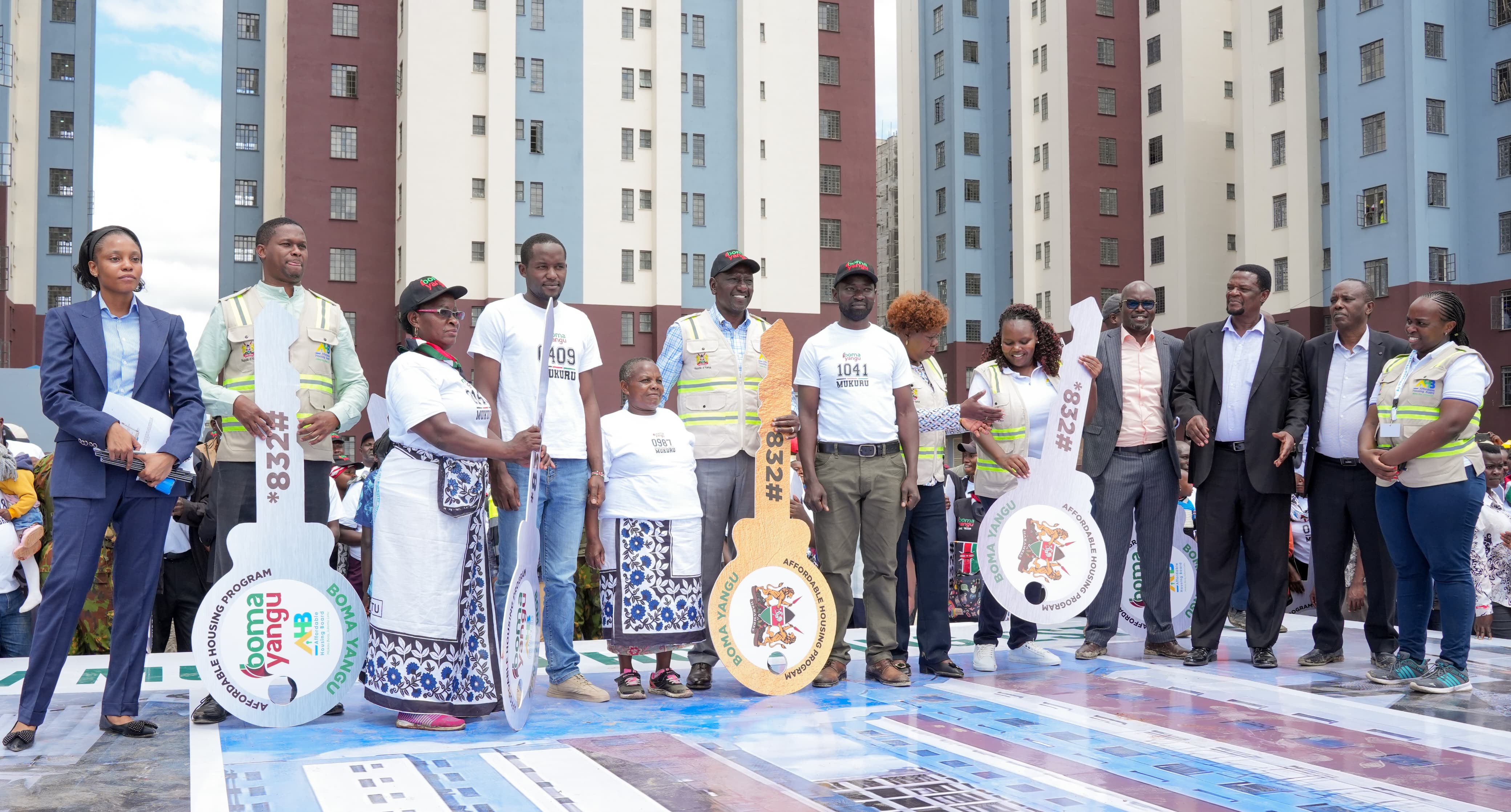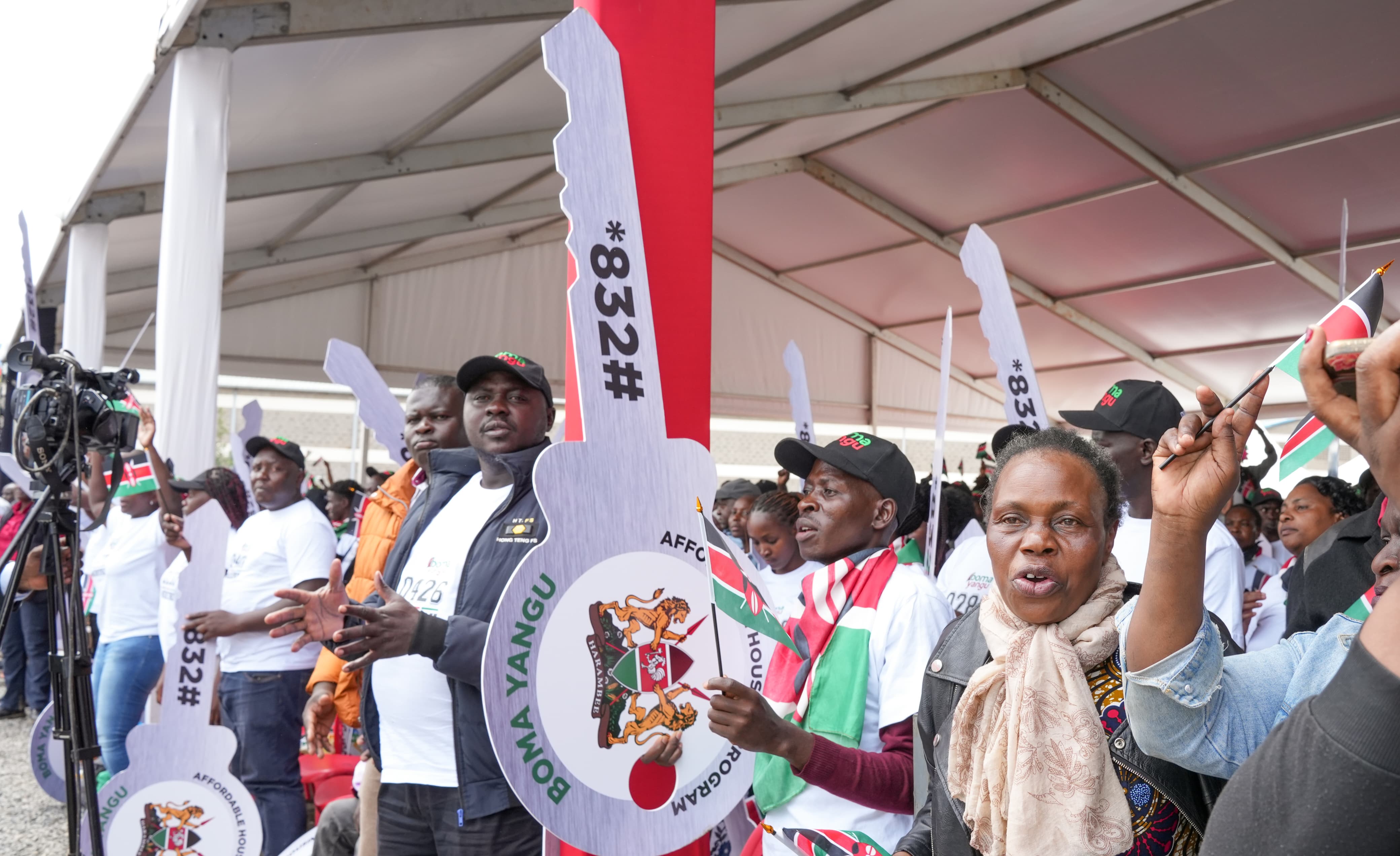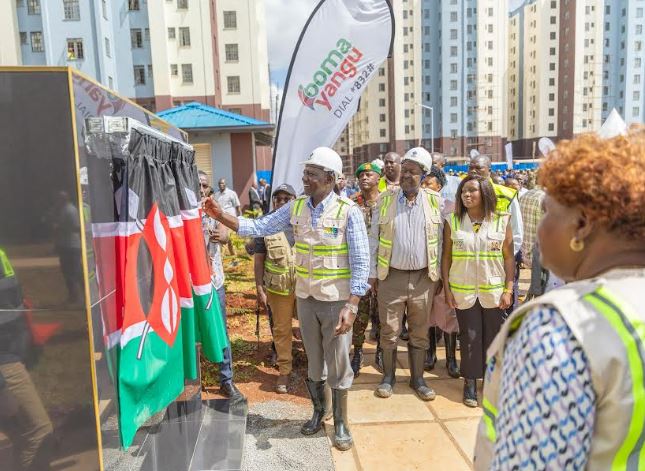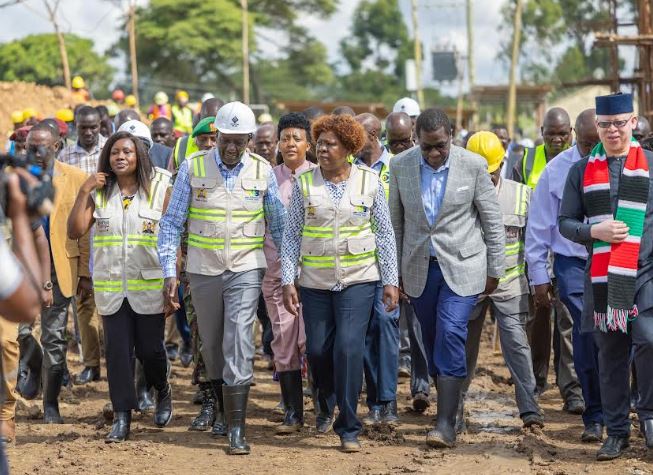
Fact about Mukuru Kwa Njenga Affordable Housing project
Register via Boma Yangu or dial *832#
Programme, which aims to deliver 200,000 housing units annually, is slowly taking shape
In Summary

Audio By Vocalize

Article 43(1)b of the Constitution provides that every Kenyan has a right to accessible and adequate housing.
As a follow-up to the article, the Kenya Kwanza Administration has up-scaled the Affordable Housing Programme (AHP) with the aim of transforming the livelihood of millions of Kenyans who have for years known informal settlements to be their homes.
The programme, which aims to deliver 200,000 housing units annually, is slowly taking shape, focused on addressing the housing shortage, especially in counties with high urbanisation and those that have historically faced infrastructure gaps.
A total of 130, 988 affordable and social housing units are under construction this year, showing a significant increment from only 8, 872 in 2022. At the procurement stage are 127,476 units are being displayed for the interested citizens to register for.

This collaboration between the National and County governments has proven critical in accelerating the projects takeoff, improving public trust and enhancing transparency throughout the construction and allocation process.
The programme links its prospective beneficiaries through an online platform dubbed ‘Boma
Yangu’ and focuses on providing decent, safe and affordable homes for Kenyan
citizens, mainly earning below Sh20, 000 with an overall aim to boost
economic growth besides creating jobs for Kenyans.

To sustain this momentum, the government has allocated Sh4.4 billion ring-fenced for the Jua Kali and MSME sectors, enabling empowerment of local artisans and entrepreneurs in the construction industry.
The Boma Yangu platform has enabled 1.2 million Kenyans to register for consideration and allow them to track their savings, view available units, participate in balloting and receive allocation updates.
The government sought to digitalise this program in allocation and monitoring to avoid the risks of manipulation and enhance public confidence in the programme.
It has also facilitated efficient beneficiary tracking, payment collection and digital correspondence between applicants and state departments.
The Programme blends social and affordable housing units as part of the Government's Five
Pillar BETA Plan, targeting mainly the low and middle-income earners.
Last week, President Ruto, accompanied by his government officials, officially handed over 1,080 social housing units, which are part of the transformative New Mukuru Housing Estate’s 13, 248 units, the largest real estate site in Kenya’s history.
“The handing over of 1,080 homes marks a turning point, restoring dignity, hope and opportunities for residents of Mukuru kwa Njenga, kwa Reuben, Mariguini and other underserved areas.
These homes
symbolise more than shelter. They unlock opportunities, safety, pride, equity
and inter-generational uplifting.” President Ruto noted in his address to the residents
of Mukuru kwa Njenga estate.
President Ruto added that homeowners who will be moving into the modern apartments will enjoy facilities like lifts, fire station, gas station, WiFi, green spaces, clean water, schools, healthcare facilities and transport linkages.
In an interview with one of the beneficiaries, Ms. Milca Thiga, our team got a clear overview of the challenges the residents had faced for years while living in the informal settlement spanning Mariguini, Mukuru kwa Njenga and Mukuru kwa Reuben encampments.
Thiga cited some of the challenges as poor sanitation, insecurity, poor healthcare facilities, poor road network and frequent fire outbreaks that frequently took them to square one.

She urges the President not to be moved by the naysayers who are trying to criticize the projects he is actualizing, saying, “doing good deeds will somehow attract negative comments.
"I am a beneficiary of this project and my house is fully furnished making me move in without incurring any costs.”
Ms. Thiga is excited to declare the challenges of poor sanitation, transportation, education and healthcare she experienced in Mariguini estate as things of the past for her, and the many fellow affordable home owners, as all these are catered for by the amenities embedded in the structure of her new home.
Another beneficiary, Mr. Thomas Langat a long time resident of the Mukuru Kwa Njenga estate and an artisan from Kariokor market shows sincere gratitude to the President for giving him keys to his home.
He does not hesitate to share how he had initially doubted the whole process explaining how media stories had discouraged him.
“From what was being propagated in the media, I was scared that the whole process of acquiring a home was going to be a blurred dream but I personally thank the President for shining us with light and allowing our dream to be a reality.” Mr. Langat said.
Government Spokesman Dr. Isaac Mwaura explains how affordable these facilities are saying, “At only Ksh. 10, the homeowner can access gas and also at Sh10 only, they can get a WiFi connection to their homes.”
“These homes are for both people in the formal and informal employment sector. 213 artisans have received on-site prior learning certification and the government has ring-fenced Sh4.4 billion for Jua Kali and MSMEs in the housing and construction sector,” the Government Spokesperson confirms.
To boost the development of affordable housing, Dr. Mwaura adds, the government has introduced a range of tax incentives aimed at encouraging greater private sector participation, with developers constructing at least 100 affordable houses annually being eligible for significant tax benefits.
These, he says, include a 15 per cent reduction in corporate tax, a 0.5 per cent drop in the Railway Development Levy, and a 1.5 per cent cut in the Import Declaration Fee (IDC).
“Such fiscal incentives are designed to lower the cost of doing business and enhance the profitability of investing in affordable housing projects.” Dr. Mwaura explains.
Beyond tax relief, the government is also taking practical steps to support developers through non-monetary incentives. This includes offering land for development, providing favourable financing conditions and establishing a conducive regulatory environment, he adds.
“By reducing bureaucratic barriers and easing access to critical resources, these measures aim to attract more private investment and accelerate the delivery of quality affordable housing across the country.” The Government Spokesperson affirms.
The writer is a PSIP Intern at the Office of Government Spokesperson-Kenya.

Register via Boma Yangu or dial *832#